#author: Philosophics
Explore tagged Tumblr posts
Text
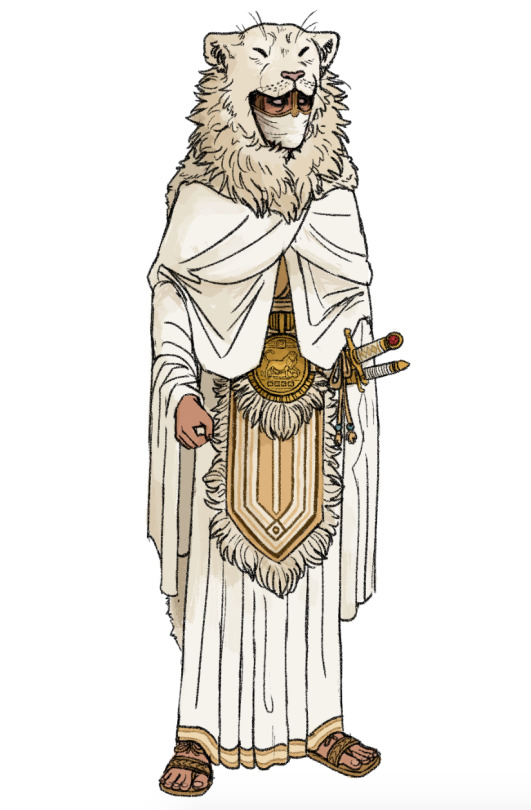
Here's what typical vestment for The Odomache looks like.
The pelt of the lion that was originally sacrificed and worn raw for her incarnation is retained throughout the years of service, preserved and fashioned into a headdress and cape (obscuring a helmet). This can get dreadfully hot in the summer but no one ever said that being a hollowed out pathway for God's spirit was easy.
The body is always obscured near completely, barring the hands, feet, and parts of the face (philosophically, these are the body's least vulnerable parts as its modes of Action, though this is in large part a practicality). This is partially a matter of psychological enforcement that this person is not Just a human, and partly a matter of protecting the part of God's living spirit that's in a wholly human body. Conceptually, the Odomache Enables tremendous power rather than being intrinsically powerful in of herself, so all manners of protecting the metaphysically vulnerable human body are of tantamount importance in her case.
The complete obscuring of any identifiable feminine form is also notably important to the underlying philosophies and biases involved. It is necessary that she is female, a condition ascribed a unique malleability to change and transformation (for good or harm), but the act of female/non-male sex and gender assignment also serves to uphold an underclass in a patriarchy that she By Necessity must be distanced from. This extends beyond the masculinized social and dress performance of Odonii to a masculinized social performance with dress that utterly obscures any part of the body that could be gendered, and dress that is not gendered in of itself (women do wear less revealing clothing than men and skirts of similar length, but the act of Fully covering the body in this form exists outside of the bounds of gendered dress).
[[It should be noted that on a historical level, this role is largely a descendant of a variety of 'celibate and/or masculinized female religious authority' figures in pre/proto-Wardi societies stretching back centuries, rather than an emergent property of contemporary religion and philosophy. This is an adaptation of older roles and worldviews to securely fit the contemporary zeitgeist, and that's part of why many aspects of this role Superficially clashes with said zeitgeist.]]
The relatively undecorated white cloak and robes in comparison to culturally favored displays of color and opulence further emphasizes a sense of the Odomache's separation from humanity. The Wardi image of God is not a human lord, but rather the world itself and the functions of the world distilled into the forms of animals. Human hierarchies exist Within God rather than God having a place within human hierarchies, so in this philosophy it's natural for this particular person of high authority to not closely resemble a Human Authority.
This is still ultimately a human body existing at the top end of a human hierarchy (and in the dimension of religious thought, it a human body holding aspects of God most specifically concerned with maintaining concepts of 'right' civilization and hierarchy), so public-facing garb like this will still include a few mundane trappings of lordship such as this fancy gold khattanocuy displaying an image of an enemy being trampled by the Face Odomache as the guardian lion. Purely ceremonial garb for the Odomache hides the body in its entirety beneath the white cloak and forgoes all decoration save for the obligatory weaponry.
A sword and dagger is worn at all times as a matter of being the ultimate physical bastion of her society's military might, and she is always accompanied by a retinue of 'lieutenants' (Extremely elite servants/squires) who carry whatever other elements of her perpetual armament are not currently in use. These weapons are Completely ceremonial in nature (to the point that they're made or plated with gold rather than anything like, durable) and there is absolutely zero expectation that the Odomache will ever directly engage in combat (the times this has happened historically have been when things have gone horribly wrong).
Her face is usually masked in public, though this is not a strict necessity of the role and is forgone for some ceremonial purposes. On these occasion, it's standard to paint the face red to still partly obscure human features in the same fashion of battlefield Odonii. As the color of blood, it positively evokes bodily vitality and strength, the living spirit of the world itself and the mode of connection to God (and will also be reminiscent of the rite of incarnation during which she is Actually covered in blood)

#When I'm talking about the philosophical angles here I'm referring to like. Mostly subconscious cultural outlooks#Like most people aren't thinking 'so she should wear plain clothing unlike a lord because God isn't a lord. But should still have Some#trappings of lordship since she's an authority figure' like most people will just read all this as natural to her role and not break it#down any further. The main exception being that most people would be directly conscious of the notion that her obscured body#is a manner of protection from the Gaze#Unrelated tags:#I think a lot about how if this was a real life historical civilization whose writing system was never decoded this would totally be#one where pop-history latches onto the notions of it having Woman Warriors or possibly even being A Matriarchy.#Because there would be tons of art of identifiably female figures carrying weapons and on battlefields and etc#and a deity(?) depicted as an anthropomorphic maned lion with sex characteristics made ambiguous via clothing but possibly being#connected to tons of other art of a visibly female (nipples) maned lion as a possible sovereignty deity trampling depictions of foreign#enemies. Like there'd be MORE than enough information in the broader sphere of its art for serious researchers to develop#fairly accurate takes but the pop culture angle would be soooooooooooo bad.#imperial wardin
210 notes
·
View notes
Text
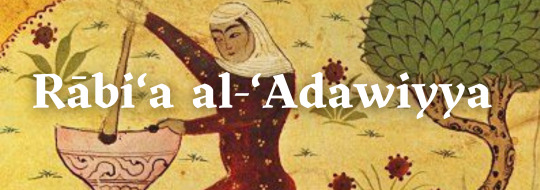
"Rābi‘a was a Muslim saint and Sufi mystic. Her contemporaries also considered her a teacher of character. There are strong elements of a Philosophy of Religion in her collection of poems which is one of the earliest to set forth a doctrine of Divine Love. The concepts that she propounds include a daring taxonomy of love and the notion that self-effacement does not erase one’s gender. She thus emphasized that women’s piety is superior to men’s (which suggests a feminist consciousness). Her poems reveal a refined mastery of Arab meters and an intricate reflection on Arabic letters and language. Her writing is part of early Sufi philosophy and has inspired Muslim mystics for centuries, among them luminaries al-Ghazzālī (d. 1111) and Farīd al-Dīn al-‘Aṭṭār (d. 1221). Some of her verses are present in all genres of Arab songs to this day.
Despite her fame as one of Islam’s greatest Sufi saints, the life of Rābi‘a al ‘Adawiyya al-Qaysiyya al-Baṣriyya (A. H. 95–185/C. E. 712–801), as she came to be known, “remains mostly elusive.” A number of Islamic sources state that she was born in Basra, a city founded by Muslims in 16/637 and known for its many ascetics. A more recent study suggests her native city may have been Damascus. Many Islamic biographical dictionaries record 185/801 as the year of her death, while one source indicates the year 135/752. The latter date seems highly unlikely, since Rābi‘a would then have been too young to meet some of the luminaries she is reported to have talked to, and she also would have died too early to have had exchanges with other distinguished visitors whose names have been associated with hers.
On occasion, her first name is given as Rāyi‘a, although this is no great concern since it may be safely imputed to the accidental addition of a diacritical point. The greater biographical question concerns her full name and whether it indicates that Rābi‘a (or her father) became a client to an Arab tribe upon conversion to Islam. And there is also the matter of her having been married or a singing slave-girl before she converted to mysticism. Part of the confusion is due to the conflation of the biographies of several female saints by the same first name or with a similar story.
Without any question, Rābi‘a left an indelible mark on Islamic mysticism like no other Sufi before her, man or woman. Many of the encounters she is reputed to have had with fellow ascetics (zāhidūn, plural of zāhid) and mystics (ṣūfiyyūn, plural of ṣūfiyy) such as Mālik ibn Dīnār (d. 123/648), Ḥasan al-Baṣrī (d.110/728), Sufyān al-Thawrī (d. 161/777–8), Ibrahīm ibn Adham (d. 165/782) ‘Abd al-Wāḥid al-Zayd (d. 177/793), and Rabāḥ al-Qaysī (d. 180/796) are obviously anecdotal, if only because a look at their respective dates clarifies that Rābi‘a could not possibly have been a contemporary to all of them.
And yet, it is conceivable that the exchanges said to have taken place with some of these very distinguished figures in Islamic tradition belonged to conversations conducted with interlocutors whose names were either lost or less prominent, in order to grant Rābi‘a a higher status. An exception is Ḥadīth-scholar Sufyān al-Thawrī, whose dates confirm him as a contemporary of the saint of Basra and whose name also appears in al-Sulamī’s Memorial. Moreover, as the following will show, the stories involving him strongly suggest that he shared an intimate spiritual bond with her.
Whoever Rābi‘a’s pious visitors were, they all bowed down before her extreme asceticism and the purity of her mystical experience. But this did not prevent them from sometimes provoking her and even testing the sincerity (ṣidq) of her religious sentiments. Agile of mind and never at loss for the right words, Rābi‘a always had the upper hand. One gets the impression that she welcomed the opportunity for verbal jousts. For instance, knowing her love of God, someone hoped to trick her by asking: “How is your love for the Prophet (may God bless and preserve him)?” She replied: “Verily, I love him. But love for the Creator has turned me away from love for created things”. Another visitor inquired about her take on Satan to which she answered: “My love for God leaves no room for hating Satan”.
On occasion, tradition recorded Rābia’s own questions to a number of individuals, making one wonder whether some of her interlocutors were not actually students of hers rather than frequent visitors. For instance, she asked them about “truthfulness” and “generosity,” clearly expecting them to give lacking answers that she would have to—and did—straighten out. Her style is reminiscent of the “What is”-question used among the “acusmatici” in the Pythagorean school. This is not to suggest that Rābi‘a was following the teaching model of this ancient Greek school, only that the parallel questioning style supports the assumption that Rābi‘a was teaching and not just receiving guests.
Some reactions to statements made in her presence, show how annoyed she could be at what she perceived to be pseudo-pious utterances. Sāliḥ al-Murrī(d. 176/792–93), who enjoyed reiterating, “When someone keeps knocking at the door, it will in time open for him,” was admonished by Rābi‘a: “How long will you keep saying that? When was the door ever closed, that it might have to open?” .This sharp riposte clearly suggests that she was in a position of authority when al-Murrī repeated his remark.
If incensed deliberately, Rābi‘a could be punishingly cruel. Thus when Ḥasan al-Baṣrī is said to have invited her to pray with him on the bare surface of a lake, Rābi‘a scolded him for being boastful. She then threw her prayer rug in the air and asked him to join her above the ground, which shamed him endlessly, since he was unable to comply. Naturally, neither of the two saints could have achieved the physical exploits they are credited with (apart from the fact that they couldn’t even have met at a stage in their lives when they were both spiritually mature), but the story nevertheless conveys how strongly Rābi‘a felt the need to correct her fellows, including well-established ones like al-Baṣrī, when she found them lacking in humility.
If nothing else, this “ḥikāya” tells us about how she was perceived. While the details of the sayings and deeds attributed to Rābi‘a may never be validated, nor falsified for that matter, what does come across is that Islam’s mystical tradition considers her a paragon in terms of her austerity, piety, and mystical teaching. Moreover, one senses the respect she was granted is not the expression of mere veneration for a person more advanced on the religious path. Rather, it is coupled with deference to an authoritative figure whose character and teaching were deemed exemplary."
Albertini Tamara, "Rābi‘a al-‘Adawiyya of Basra, 712–801/185–95", in: Waithe Mary Ellen, Boos Dykeman Therese (eds.), Women Philosophers from Non-Western Traditions: The First Four Thousand Years
#Rābi‘a al-‘Adawiyya#women in history#women's history#historyedit#female poets#female philosophers#middle eastern history#sufism#women in religion#philosophy#8th century#iraq#iraqi history#history#female authors#abassid caliphate
98 notes
·
View notes
Text
I have a...contentious relationship with the posts that drift across my dashboard occasionally, especially those which essentially ask, "what if this concept was different, and Good(tm) instead?" I've had feelings about it with immortals, I've had feelings about it with historical same-sex marriages, and now I'm going to have it about "king stealthily gathers the best minds around him, playing them off as 'just' concubines."
mostly, if you think you can gather a bunch of very intelligent people in a room and not have them hate each other for about 3-5 different reasons (each. each person hates each other person for 3-5 distinct reasons.) then I'm sorry---you are living in a fantasy world. And not the fun kind, where the divine right of kings somehow got it right this time.
I like most of my colleagues. I respect them and the knowledge they bring to the table; I do genuinely want to work with people rather than against them. But I have yet to work for a corporation that is not the densest, most intricate web of shifting alliances, unspoken (or spoken, some people are very open about it) hatreds, histories that you may or may not be be privy to; easy-to-make missteps, blame games, and people working out their personal psychoses on each other.
In this fictional scenario, you are making it so, so much worse---or so implausible that it beggars belief. You are essentially setting up a singular ruler who is (a) charming enough to recruit this Band of Brilliants (because of course this would be a different story if the king was forcing their participation, we would expect a different response); while also being (b) smart enough to recognize their superior knowledge and clever enough to maintain a singular grip on power, while floridly lying to the other members of the court; yet nevertheless (c) socially-sophisticated enough to settle the Brilliants' conflicts, or even just the legitimate disagreements (because there will be just plain old infighting and jealousies!) and make all these geniuses get along. Not to mention, no one is right all of the time---I really hope this prize without price has figured out how he and the kingdom will deal if his meteorologist concubine misses a horrendous drought, or if his naval battle concubine miscalculates how many ships their enemy would bring to bear.
If that's not an issue? Then at that point, you're talking about god himself---and even he had to put up with a coup by his COO.
#I will not link to any of the original posts because their authors do not deserve that.#but please know that I seethe.#this doesn't even get to how this automatically assumes that the people most capable of doing a job#are also capable of passing as sex-on-legs.#which is...okay. that's..............okay.#I mean I guess!!! go have fun!!!!! I know people don't like horror like I do!!!!#but also. I spent 3 hours literally today dealing with work-related tizzy about something that doesn't really matter.#I made a powerpoint. I had 2 separate conversations and then those people talked to other people and then me again.#and at the end it was fine.#kill the fantasy of the philosopher king in your head please. my heart can't take it.#for my own purposes
130 notes
·
View notes
Text
I have a question for my fellow authors. Lately I’ve been curious, as I’ve been reflecting on my writing throughout the years. I realize some of the scenes I’ve written about have been inspired by my personal life. In the past I’ve found myself in certain unpleasant situations, and writing about them (even in a sexual or romantic light) has been very therapeutic, even when the real life situation has been terrifying. It makes me wonder if we as people tend to sexualize or fetishize traumatic situations as a way to cope with them? Or maybe it’s because the fear receptors in the brain are close to the horny ones?
Like yesterday I saw someone spying into my room (fucking terrifying, made me buy thicker curtains lmaoo), and after the shock went away, my thought process was, hmm, that would be a great scene for my blog 😭 Is anyone else like this, or I’m the only one?
55 notes
·
View notes
Text

#i got war and peace today . leo tolstoy war and peace#character development bc i used to sparknote all my classics in hs sorry 😟#but ive been wanting 2 read this one soo bad .. sights set on pierre bezukhov .. the yearning . the philosophizing#and i rly enjoy the prose & syntax so far idk i was LOL i was gna read da 4mbessa book but ok trust im not hating im really not but i stared#at the first few pages and o was like i dont want to read this actually LMAOOO#im so pickyyy ab style >__<…. but ya i picked up the pevear and volokhonsky translation#and the intro page excites me . the drops dripped vs branches dripped translation debate sold me ykwim#ugh i love when the authors note goes into a little biography .. setting the scene for why the book was written / inciting events#and how critics regarded his style and what tolstoy wrote in later articles ab role of historian / role of artist and the unique nature of t#this book & how it can be classified . yes… YESSS!!! TEACH ME !#im emvarrassed to say . natasha pierre & the great comet of 1812 is probably one of if not my favorite musicals of all time#so im alr endeared too even if thats just a popularized rendition HAHAHAHA#and i was playing civ vi the other day when my great writer produced war and piece w an excerpt and i wa like ok o need to join the club its#about time#yaay . ok#anyways#im cold its been so cold this week
43 notes
·
View notes
Text
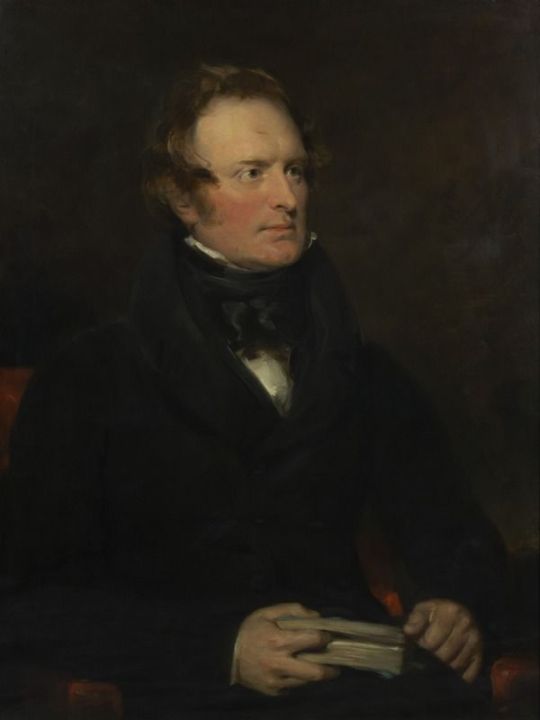
Professor John Wilson (nom de plume, 'Christopher North'), 1785 - 1854. Author and Moral Philosopher
Artist: Sir John Watson Gordon (Scottish, 1788 - 1864)
Date: 1829
Medium: Oil on canvas
Collection: National Galleries of Scotland, Edinburgh, Scotland
Professor John Wilson
John Wilson FRSE (18 May 1785 – 3 April 1854) was a Scottish advocate, literary critic and author, the writer most frequently identified with the pseudonym Christopher North of Blackwood's Edinburgh Magazine.
He was professor of moral philosophy at the University of Edinburgh from 1820 to 1851.
#portrait#half length#sitting#artwork#professor john wilson#scottish author#scottish moral philosopher#scottish literary critic#chair#black suit#white shirt#black bow#painting#fine art#oil on canvas#oil painting#scottish culture#scottish art#sir john watson gordon#scottish painter#european art#19th century painting#national galleries of scotland
22 notes
·
View notes
Text
The truth does not require your participation to exist. Bullshit does.
Terence McKenna, Source Unlisted.
#philosophy tumblr#philoblr#philosopher#author#terrence mckenna#truth#ethics#dark academia#life quotes
57 notes
·
View notes
Text
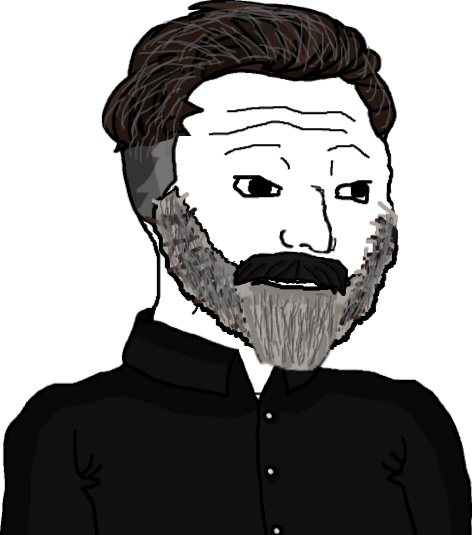
Title/Name: Alan Wilson Watts, popularly known as 'Alan Watts', (1915–1973). Bio: British and American writer, speaker, and self-styled "philosophical entertainer", known for interpreting and popularising Buddhist, Taoist, and Hindu philosophy for a Western audience. Country: United Kingdom Wojak Series: Feels Guy (Variant). Image by: Wojak Gallery Main Tag: Alan Watts Wojak
#Wojak#Alan Watts#Alan Watts Wojak#Philosophy#Philosopher#White#Gray#Brown#UK#United Kingdom#Feels Guy#Feels Guy Wojak#Feels Guy Series#Writer Author
25 notes
·
View notes
Text
Tyrant Philosophers Gang!
Did you know that Mr. Tchaikovsky "fan" casted this series(plus his other books as well) and yall!
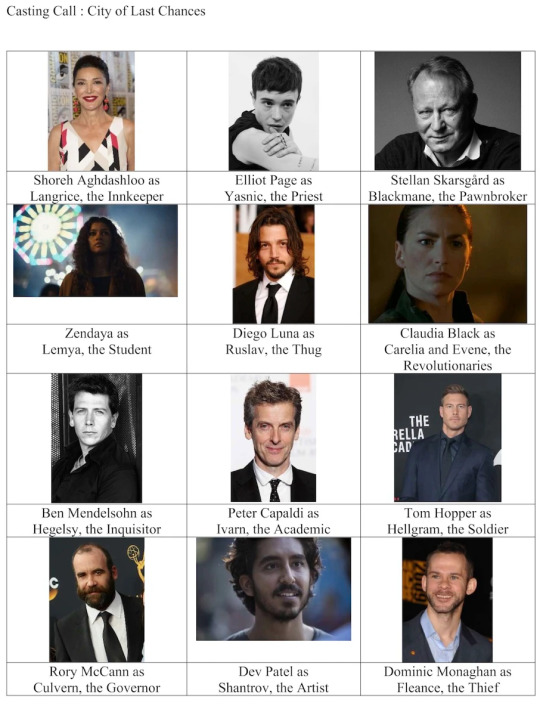
Plus the castings for the other books in the series
#bookblr#books#adrian tchaikovsky#tyrant philosophers#the tyrant philosophers#city of last chances#house of open wounds#days of shattered faith#face claims#it's official from the author himself: Yasnic has Tboy swag 😎
28 notes
·
View notes
Text
But does your man buy an entire hawking establishment just because he saw a painting of a hawking party where one of the women kind of resembled you?
#helen by maria edgeworth#is equal parts slog and wild ride#i can see why this would have been popular in jane austen's time#but it's exactly why it's dated now#all these upper-crust people talking about current literary figures and customs#flinging around french all the time#compare that to austen's middle-class country people#who live in a different culture than us but have a lot of the same normal daily problems#also austen's pacing and dialogue are so much better#the number of times characters stop to expound upon some philosophical point!#just in the course of daily conversation!#this story's fun enough for what it is#(digging the 'love triangle' where one of the guys is just going after the girl because the other guy annoys him)#but while i can see why austen might have enjoyed edgeworth i hope she knows she was the better author
42 notes
·
View notes
Text

Books of 2025: MINIMIZING MARRIAGE by Elizabeth Brake.
As part of my quest to read aro-adjacent nonfiction, I put in an inter-library loan request for this many moons ago. It's due back today, so naturally I finished it this morning at 12:04AM technically, we'll count that as a win.
The whole book was much more readable than expected, given that its header declares it STUDIES IN FEMINIST PHILOSOPHY--the prose was fine, actually! I don't have the background to speak to the philosophical or feminist framing of her arguments, but her main proposition is that reworking the institution of marriage to one of "minimal marriage" would be good for everyone. She defines minimal marriage as "a legal framework that avoids amatonormativity, supporting caring relationships including 'traditional,' polygamous, and same-sex marriages as well as 'Boston marriages,' friendships, and urban tribes." Basically: take the good parts of marriage (contractual agreements/protections, the social indicator of This Relationship Is Important To Me, forcing state/governmental recognition of chosen relationships, etc.), but divorce (ahaha) them from One Central Sexual/Amorous Relationship (and also from childrearing, because that could be a separate thing) and allow those benefits to be divvied out to an individual's network of care as they see fit. It was interesting!
Now, I didn't actually read this for the marriage angle, I read it for the amatonormativity pieces, so I blitzed through most of the book. Chapter 4, "Special Treatment for Lovers: Marriage, Care, and Amatonormativity," was where I spent most time and took the most notes. (For context: I took 4.5 pages of notes total, and 1.5 of those were on chapter 4.) I probably could've read just that chapter, honestly, and gotten what I wanted from this book--the focus on amatonormativity in this chapter was validating and coherent and well-articulated, which I appreciated as An Aro™ swimming in its mire. Example, from page 89:
Amatonormativity prompts the sacrifice of other relationships to romantic love and marriage and relegates friendship and solitudinousness to cultural invisibility.
Which!! Yeah!! That's it, baby!!!!
Anyway. Glad I finally got my hands on a copy of this, glad to have read it and to absolutely not have saved the relevant pages in digital format, because holy shit is it hard to find physically. A lot to chew on, but not as much as I feared from 206 pages of Philosophy; much more approachable than anticipated, if this is a thing you're interested in, too!
#books#books of 2025#minimizing marriage#elizabeth brake#amatonormativity#aro#book reviews#book photos#seriously i took SO MANY NOTES on chapter four lol#also i had to try twice to get the interlibrary loan to come in because it got canceled the first time??#and the librarian looked at me like i was nuts for asking but. it really was canceled. so he backpedaled lol#also. i got a copy from kenyon college's library. but even their hardback library copy was printed on demand in 2012????#i'm wondering if oxford ever actually published this book for real or if it's always been On Demand#which. would explain. why it's so expensive and hard to find.#was interesting! liked having access to the bibliography!!#but holy shit allo philosophers are Not Okay#especially not the het men allo philosophers i think#what a dumpsterfire#i have to turn this in this afternoon but it's a glorious day and i'm gonna take a walk about it >:D#oh yeah also: she did use WAY MORE EXCLAMATION POINTS than i was braced for?????#ma'am is that Legal in philosophy??????#the last academic book i read for fun was about architectural obsolescence and that author Certainly Did Not Do That but.#maybe decaying buildings are less fun than rights and justice#idk i don't go here
9 notes
·
View notes
Text
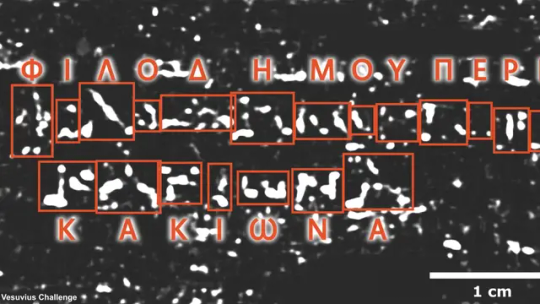
Title and Author of a Herculaneum Scroll Decoded After 2,000 Years
Researchers working to decipher the contents of a burned, still-rolled scroll have uncovered both the author and the title of the text nearly 2,000 years after it was buried in the Mount Vesuvius eruption.
The scroll — named PHerc. 172 — is one of hundreds from the ancient Roman town of Herculaneum, which was buried under volcanic debris when Mount Vesuvius erupted in 79 AD, according to the Vesuvius Challenge, an initiative focused on decoding the texts of the Herculaneum scrolls without needing to unroll them.
Preserved under mud and ash in a villa believed to have been once owned by the father-in-law of Julius Caesar, the scrolls were discovered by an Italian farmer in the 18th century.
Burned so badly they were carbonized, they are extremely fragile. Over the years, scholars have tried a range of methods to unroll them, including using weights, chemicals, gases and pulverization, though this often led to the scrolls being damaged or destroyed.
The Vesuvius Challenge was launched in 2023 to encourage researchers from around the world to try and decipher the scrolls by virtually unwrapping and decoding them.
Now, Marcel Roth and Micha Nowak, graduate students from Germany’s University of Würzburg, have uncovered the title and author of PHerc. 172. Vesuvius Challenge researcher Sean Johnson made the same discovery around the same time, and both findings were independently reviewed by the competition’s papyrological team, according to a Tuesday press release from Oxford University’s Bodleian Libraries, where the scroll is housed.
The text deciphered identifies the scroll as “On Vices” by the Greek philosopher Philodemus, according to the Vesuvius Challenge. It is a part of Philodemus’ ethical treatise known in full as “On Vices and Their Opposite Virtues and In Whom They Are and About What,” and could even be the first book in the series, though this is not yet clear.

Oxford University’s Bodleian Libraries suggests that the book number could “plausibly” be read as an alpha, which would indicate that the scroll is book one in the series, but it could also be other numbers, such as a delta, which would mean it is book four.
Scholars have generally thought that the first book of “On Vices” was a text called “On Flattery,” but the content of PHerc. 172 does not correspond with this.
Philodemus, according to the Bodleian Libraries, was an Epicurean philosopher whose teachings “emphasise the pursuit of pleasure as central to a good life.” The majority of the scrolls found preserved in the Herculaneum villa were his works, Bodleian Libraries said.
Michael McOsker, a researcher in papyrology at University College London, who is also a member of the Vesuvius Challenge papyrology team, called the new discovery a “very exciting development.”
“Other books from the On Vices and their Opposite Virtues are known from the papyri that were physically unrolled — best known are On Property Management (book 9, presumably the opposite virtue to greed) and On Arrogance (book 10, presumably the opposite vice to having a correct evaluation of yourself), but there are others too,” McOsker said.


“This will be a great opportunity to learn more about Philodemus’ ethical views and to get a better view of the On Vices as a whole, especially if it turns out to be the first book,” McOsker said.
This find, the first time a scroll’s title has been read, is the latest from the Vesuvius Challenge.
In October 2023, the first full word from one of the unopened ancient papyri was decoded with the help of computer technology and advanced artificial intelligence. The word was “πορφυρας” or “porphyras,” which is Greek for purple.
And in February, researchers investigating columns of text from PHerc. 172 identified the word “διατροπή,” meaning “disgust,” which appears twice within a few columns of text, the Bodleian Libraries said.
By Catherine Nicholls.
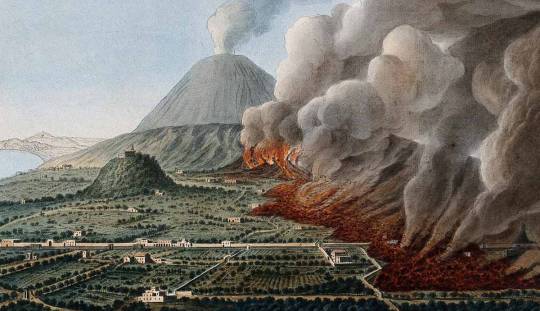

#Title and Author of a Herculaneum Scroll Decoded After 2000 Years#herculaneum#pompeii#mount vesuvius#Greek philosopher Philodemus#ancient scrolls#ancient artifacts#archeology#history#history news#ancient history#ancient culture#ancient civilizations#roman history#roman empire#greek history
18 notes
·
View notes
Text
i think one of the reasons i love books and literature is that, in a way, its a conversation. partially one-sided, sure, but a conversation nonetheless. the author speaks to me and i listen, hanging on every word they say.
#literature#books and reading#books#reading#author#i hope this makes sense#i guess im feeling philosophical
13 notes
·
View notes
Text
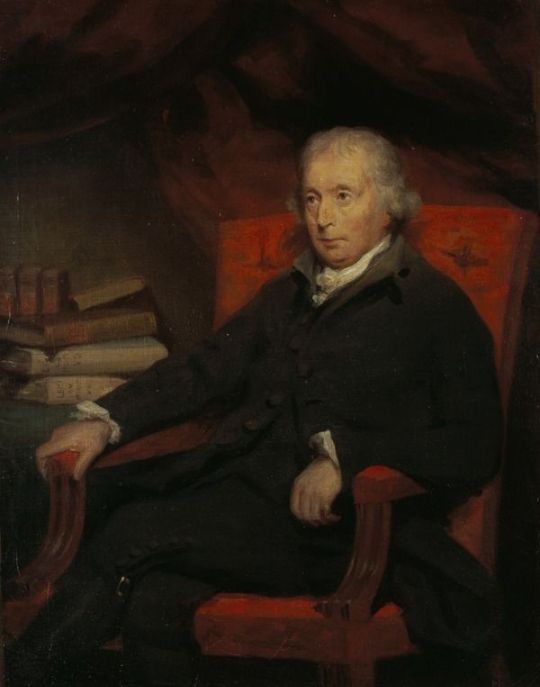
Professor Adam Ferguson, 1723 - 1816. Philosopher and Author
Artist: Unknown; After Sir Henry Raeburn (Scottish, 1756 - 1823)
Date: After 1800
Medium: Oil on canvas on panel
Collection: National Portrait Gallery, Edinburgh, Scotland
Adam Ferguson
Adam Ferguson, FRSE (Scottish Gaelic: Adhamh MacFhearghais), also known as Ferguson of Raith (1 July N.S. /20 June O.S. 1723 – 22 February 1816), was a Scottish philosopher and historian of the Scottish Enlightenment.
Ferguson was sympathetic to traditional societies, such as the Highlands, for producing courage and loyalty. He criticized commercial society as making men weak, dishonorable and unconcerned for their community. Ferguson has been called "the father of modern sociology" for his contributions to the early development of the discipline. His best-known work is his Essay on the History of Civil Society.
#portrait#three quarter length#scottish philosopher and author#sitting#table#books#chair#interior#curtain#costume#painting#oil on panel#fine art#oil painting#artwork#scottish culture#scottish art#sir henry raeburn#scottish painter#european art#19th century painting#national galleries of scotland
13 notes
·
View notes
Text


Albert Camus 1955.
45 notes
·
View notes
Text
Happiness is a byproduct of function, purpose, and conflict; those who seek happiness for itself seek victory without war.
William S. Burroughs, Source Unlisted.
#philosophy tumblr#philoblr#dark academia#life quotes#author#philosopher#american philosophy#william s burroughs#meta ethics#happiness#purpose#truth#wisdom of life#philobr
18 notes
·
View notes